
Dear friends of Berkeley Journalism,
It’s an irony of the pandemic that at the same time many of us face a daily regimen of confinement and isolation, we are part of a worldwide fellowship comprising billions of people to whom we’re inextricably joined. We huddle alone yet shape our futures together.
There’s some comfort in that, I think, just as there is in realizing that this is a historic moment, and the fear, anxiety, and physical danger we all face are part of living through history from the inside out. I hope you’re taking time to memorialize your experiences, whether through photos or journal entries or Zoom recordings. When you’re old, the youngsters will demand to know what it was like, and you will be glad to have help telling them.
Above all, I hope that you and yours are staying safe and healthy. The community you’re part of, which shares your commitment to this School and its mission, isn’t vast, and we need all of you. I implore you to prioritize care of yourselves, empathy for others, and faith that humanity will prevail.
Thanks to your feedback on past Dean’s Letters, we’re trying a new approach this time by highlighting “Three Big Things” in this update, followed by detailed news of events and accomplishments for those who want to be thoroughly informed. Subsequent letters will be shorter and more frequent.
Big Thing #1: How are students doing and how can I help?
COVID-19 and its shelter-in-place rules forced us to transform the fundamentals of our academic and institutional life in early March, with little time to plan and less time to execute. We had to make gnarly decisions about how to handle classes, admissions, summer internships, revenue-production, the full roster of major springtime activities—including the marquee Logan Symposium on Investigative Reporting—and the end-of-year events honoring our graduating class, including Showcase and Commencement. With summer approaching, the Class of ‘20 is acutely anxious about jobs in an industry where the climate has lurched from chilly to frost-bitten. In the meantime, our Chancellor is projecting upwards of $200 million in losses campus-wide.
That said, there is also great news.
In April, Berkeley Journalism joined forces with The New York Times for an unprecedented partnership to mount a comprehensive effort to chronicle this extraordinary crisis in the nation’s most populous state. This collaboration is the brainchild of the School’s Investigative Reporting Program, led by multiple Pulitzer winners—and Times veterans—Professors David Barstow and Geeta Anand. More than 80 students swiveled from all or part of their course obligations to take part in this initiative. With guidance from more than a dozen instructors, students have been producing coverage for The Times and other media outlets, including a historic story about the country’s first fatal case, for which Katey Rusch (’20) was part of the reporting team.
Special thanks to our Advisory Board Member, Angela Filo (’99), for making the first gift of $50K in support of this extraordinary initiative, the first partnership between The Times and any journalism school. We are eager to extend it through the summer with paid reporting slots so that participating students can meet their internship obligations. If you are inspired to lend support please give now or contact our new assistant dean for advancement, Jeff Rhode (’95 & ’00), to learn more.
Big Thing #2: Acknowledging our achievements…
With the encouragement of Advisory Board member and NPR White House correspondent Tamara Keith (’01), our new Berkeley J-Network launched and now provides all alumni with a user-friendly forum for engagement. It’s a wonderful way to connect with classmates, peers and mentors while practicing prudent distancing. Please join our Berkeley J-Network, and contact Julie Hirano if you have any questions.
“The Trials of Gabriel Fernandez,” a six-part documentary series based on reporting by IRP fellow Garrett Therolf, began streaming in February and debuted at No. 1 on Netflix in the U.S. Students Cecilia Lei (’19), Casey Smith (’20) and Alyson Stamos (’20) contributed reporting to this powerful series, which examines the brutal death of 8-year-old Gabriel Fernandez at the hands of his mother and her boyfriend, and the failures of child protective workers to save him. If you are moved to support more reporting like this, you can do so here.
Associate Prof. Elena Conis (’04)—a historian of health and medicine and director of our joint graduate program in Public Health & Journalism, discussed the economic disruption of past pandemics in a column for Time in March, and continuing lecturer Jennifer Kahn (’00) examined the prospects for heading off the next coronavirus in a long takeout in the New York Times Magazine in April. Plus, Prof. William Drummond’s new book, Prison Truth: The Story of the San Quentin News, chronicles his nine years of assisting the unique inmate publication.
Berkeley Journalism lecturer T. Christian Miller and nearly a dozen alumni were honored by this year’s Pulitzer Prizes. Miller, a senior investigative reporter at ProPublica, won his second Pulitzer, the prize in National Reporting for an investigation into America’s 7th Fleet after a series of deadly naval accidents in the Pacific. Alum Lucas Waldron (’17) was investigations producer on the first article in the series. Tracy Weber (’89) also contributed to this series.
Cat Schuknecht (’18) was a producer, and N’Jeri Eaton (’10) was executive producer and editor, on the NPR podcast “White Lies”— “a riveting seven-episode podcast that doggedly reinvestigated one of the most infamous murders of the Civil Rights era,” named a Pulitzer finalist for audio reporting.
Rachel de Leon (’14) was a producer, Rafael Roy (’18) a videographer, and Skyler Glover (’21) and Amy Mostafa (’20) were production assistants on the Reveal series “Behind The Smiles,” a finalist for the Pulitzer in Explanatory Reporting.
Austin Ramzy (’03) was on the reporting team of The New York Times that was named a finalist in International Reporting “for gripping accounts that disclosed China’s top-secret efforts to repress millions of Muslims through a system of labor camps, brutality and surveillance.”
Malcolm Gay (’03) was part of The Boston Globe’s team that was named a finalist for Local Reporting for its “engaging approach to exposing socioeconomic inequities by surveying the city’s brightest public high school students a decade after graduation.”
Alexandra Berzon (’06) and the staff of The Wall Street Journal were finalists in Investigative Reporting “for an exhaustive investigation into Amazon, the world’s largest retailer, that revealed a largely unregulated and highly profitable third-party flea market and the potentially deadly results of its peddling of unsafe and banned products.”
Big Thing #3: Comings and goings…
In April we announced the appointment of filmmaker Jennifer Redfearn as professor of documentary and director of the School’s prestigious documentary program. She directed and produced the 2011 Academy Award-nominated film, Sun Come Up, about an island community in the remote South Pacific that was forced to relocate by rising seas and climate change. For more than a decade, Redfearn produced documentaries, multimedia, and nonfiction content for PBS, HBO, National Geographic, CNN, and Discovery in roles that included producer, director, camera operator and editor. As documentary chief, she follows such esteemed filmmakers as Jon Else, Orlando Bagwell, Dawn Porter, Carrie Lozano (’05), Cassandra Herrman (’01) and Kelly Whalen (’01).
Also, I am pleased to welcome three outstanding new staff members: Annette Garcia as senior assistant dean and chief administrative officer; Dr. Tracy Pascua Dea as senior director of student services; and Betsy Rate as director of career services. Their appointments are a powerful reassurance that our School will continue to thrive following the departures of two highly esteemed, long-time colleagues, chief administrative officer Roia Ferrazares, and student services chief Joanne Straley. Both left us for promotions elsewhere on campus, and leave behind a following of friends and admirers.
Finally, an update on the search for my successor. Confidential nominations, inquiries and applications can be directed to Philip Tang and Breanna Liddell with Witt Kieffer, here. If you know of strong candidates, please urge them to apply. The deadline for applications is June 30. The COVID-19 contagion has slowed the search, so I have agreed to serve as dean until my successor is appointed, and I am determined to leave our School in strong academic, administrative and financial shape.
In closing, there’s nothing easy about the challenges that lie ahead, so let me thank you for all the important ways each of you support and advocate for Berkeley Journalism.
With warm regards,

Edward Wasserman
Dean
For a deeper dive into the imaginative ways that Berkeley Journalism is responding to the unparalleled challenges of the current crisis and more, please read on:
The New York Times COVID-19 initiative drew praise from Times Executive Editor—and Berkeley Journalism Advisory Board member—Dean Baquet, who said: “This is a chance to work with one of the best journalism schools in the country. The story of this virus is one of the biggest of our time, and having blanket coverage of its spread and effects is important to our readers in California and around the world.”
Under the leadership of professors David Barstow and Geeta Anand, teams organized by the Investigative Reporting Program are producing stories that run in the main edition of The Times and its five-day-a-week statewide report California Today. Student COVID-related stories have also appeared in KQED, The Atlantic, the Los Angeles Times, The Desert Sun, Berkeleyside, CalMatters, the San Francisco Chronicle and elsewhere. You can find all of our COVID stories here.
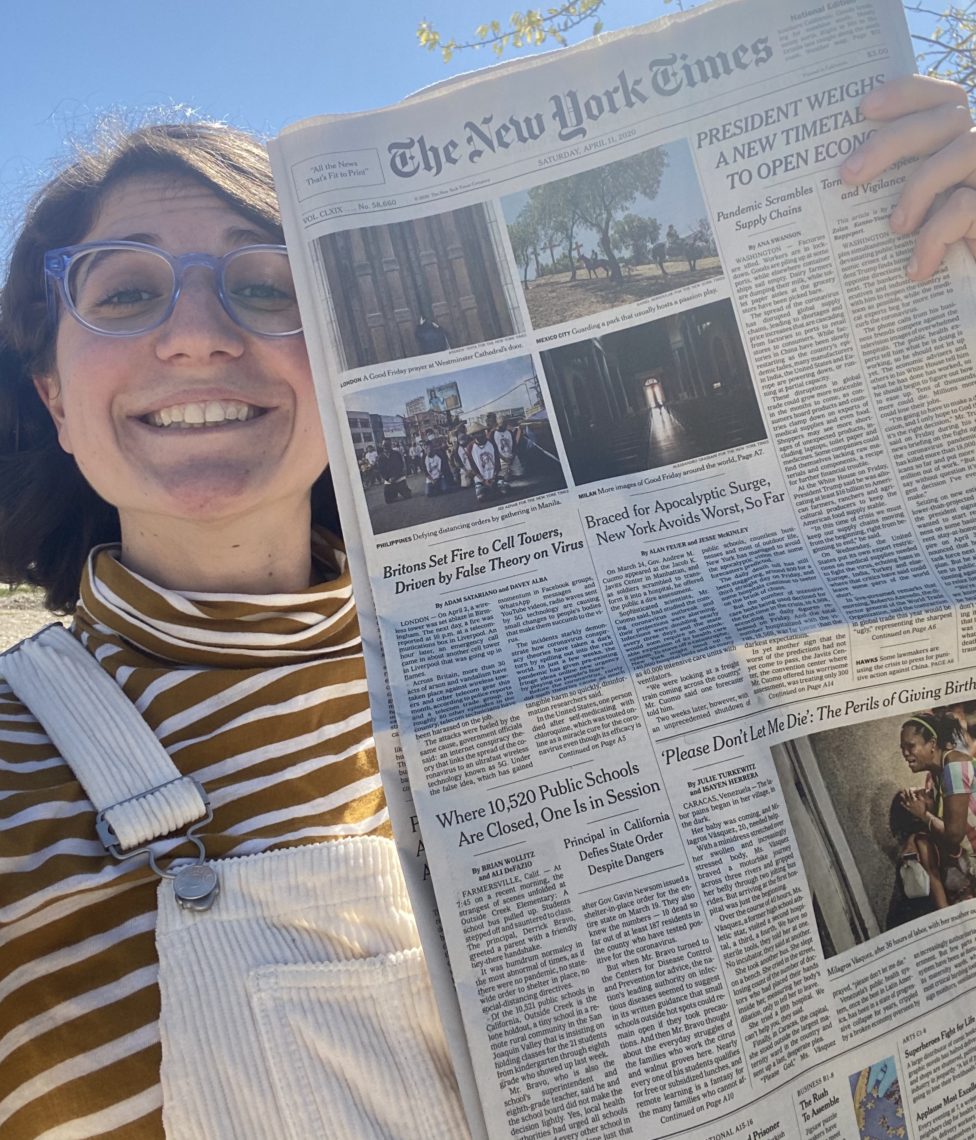
Ali DeFazio (’20) holds her first front-page story in The New York Times, co-authored with Brian Wollitz (’21), on California’s lone open school.
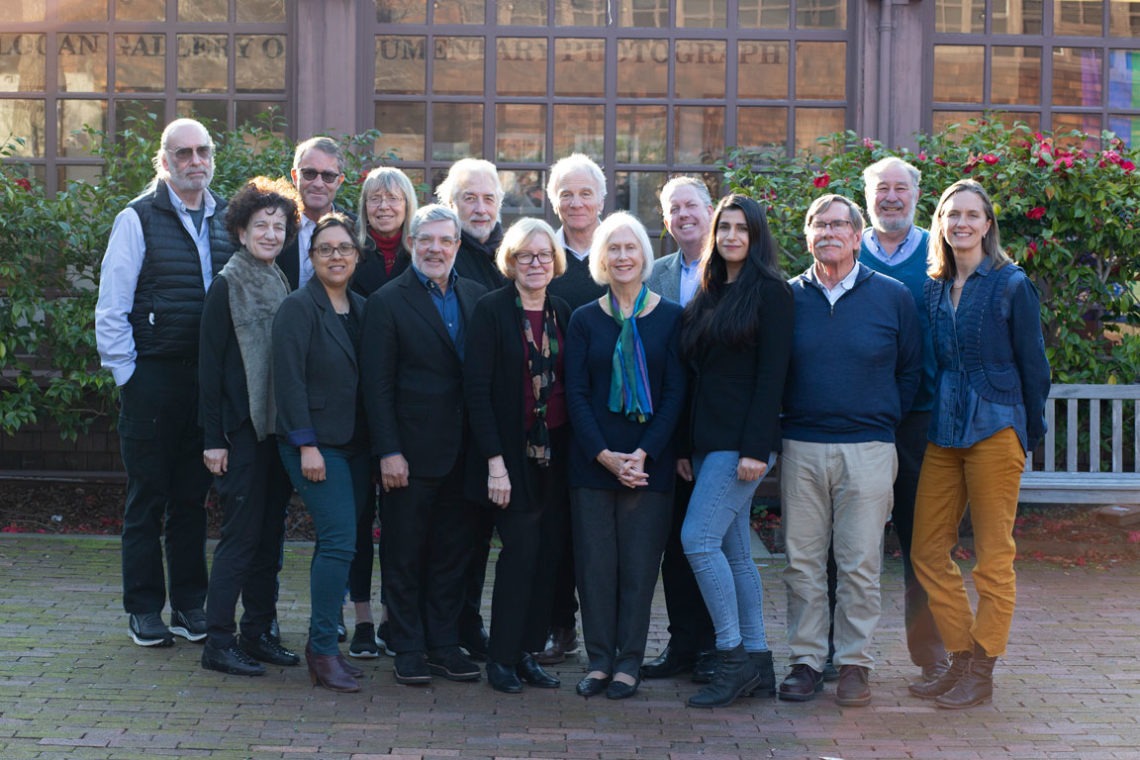
Clockwise from upper left: Richard Logan, John Battelle, Esther Wojcicki, Richard Gingras, Ed Wasserman, Jeff Rhode, Steve Silberstein, Angela Filo, Robert Bishop, Zainab Khan, Deborah Kirshman, Jo Anne Wallace, David Corvo, Carrie Lozano, Shana Penn. Photo: Vishakha Gupta
In February, the Advisory Board met for a productive and inspiring gathering, which was successful enough to prompt members to seek a follow-up meeting during the summer.
Among the weekend’s highlights were a pre-election discussion with Board member and Professor of Public Policy Robert Reich; Saturday’s student panel with producer/director Ashley Omoma (’20), who talked about her thesis film on reproductive access, Gisela Pérez de Acha (’20) who walked us through conducting open source investigations by plumbing social media without succumbing to fabrications, and Katey Rusch (‘20), who talked about a six-month investigation involving more than 30 newsrooms across California, which found hundreds of convictions against serving police officers, and a lunch conversation with four-time Pulitzer winner Prof. David Barstow, who talked about his ambitious plans for the IRP.
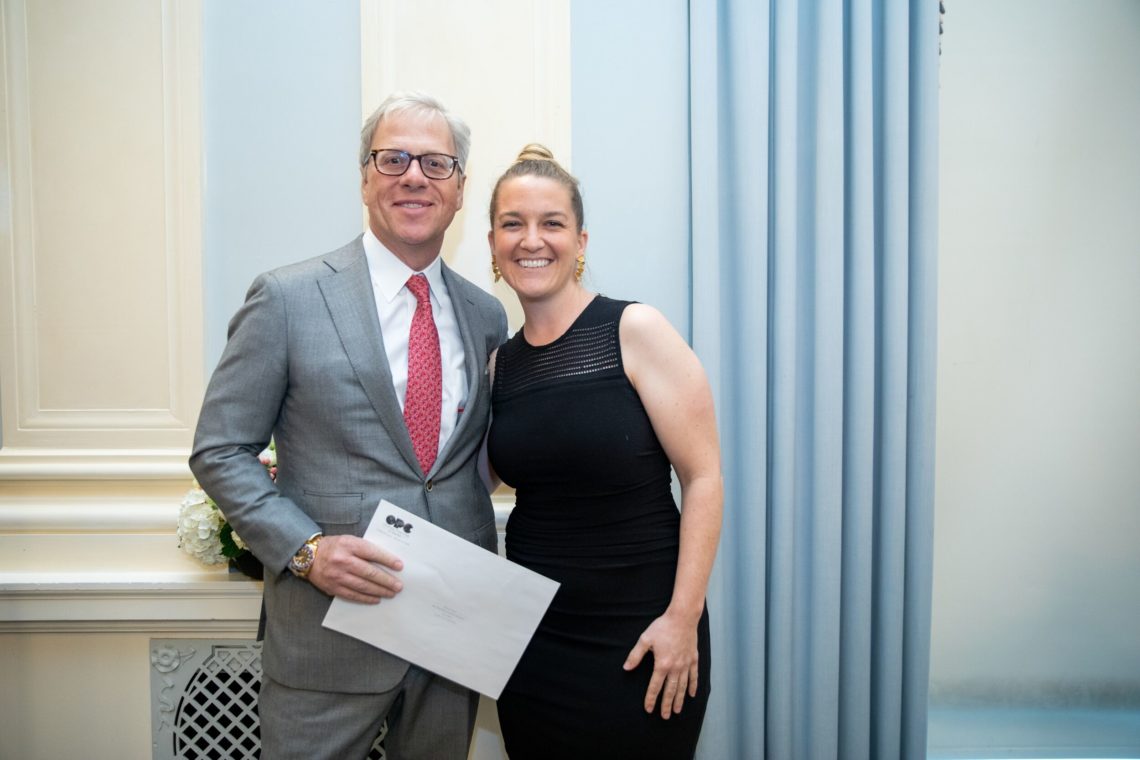
Roy Rowan’s son Marc and Sarah Trent (’20), winner of the 2020 Roy Rowan Scholarship from the Overseas Press Club Foundation February 28, 2020.
In student news, Sarah Trent (’20) received an Overseas Press Club Foundation Scholar Award at the OPC’s annual ceremony in New York in February, marking an unbroken decade of honors for Berkeley Journalism students in the annual competition. Sarah was selected for the Roy Rowan Scholarship and fellowship placement with The Wall Street Journal in Hong Kong.
Wesaam Al-Badry (‘20) was awarded the Jim Marshall Fellowship, our top honor for promising photojournalists. Read Brett Simpson’s (’21) profile of him here. He also received a grant from the National Geographic Society to report on COVID-related stories in the Central Valley, and had his thesis project published as a photo spread in The Atlantic.
California Magazine profiled second-year students Laurence Du Sault and Katey Rusch about their role in a six-month Investigative Reporting Program investigation on how often police officers in California are convicted of crimes and what happens to them when they are—published in more than 30 newspapers.
Producer/director Meg Shutzer‘s (’20) inspiring documentary short about AJ Andrews—the first woman to win a Rawlings Gold Glove, given to the best fielders in baseball—won the Audience Award at San Francisco IndieFest.
Filmmaker Nisha Balaram (’20) was awarded the Chauncey Bailey Fellowship. Read Brett Marsh’s (‘21) profile of her here. The Chauncey Bailey Graduate Fellowship was established in 2012 by Alan Mutter, a longtime instructor with Berkeley Journalism, to honor Chauncey Wendell Bailey Jr., editor of the weekly Oakland Post, who was murdered in 2007 by a crime syndicate he was investigating.
Photographer Clara Mokri (’21) is this year’s winner of UC Berkeley’s campus-wide Dorothea Lange Fellowship, a $4,000 award given to a Berkeley graduate student or faculty member who has demonstrated outstanding work in documentary photography. Read about her here.
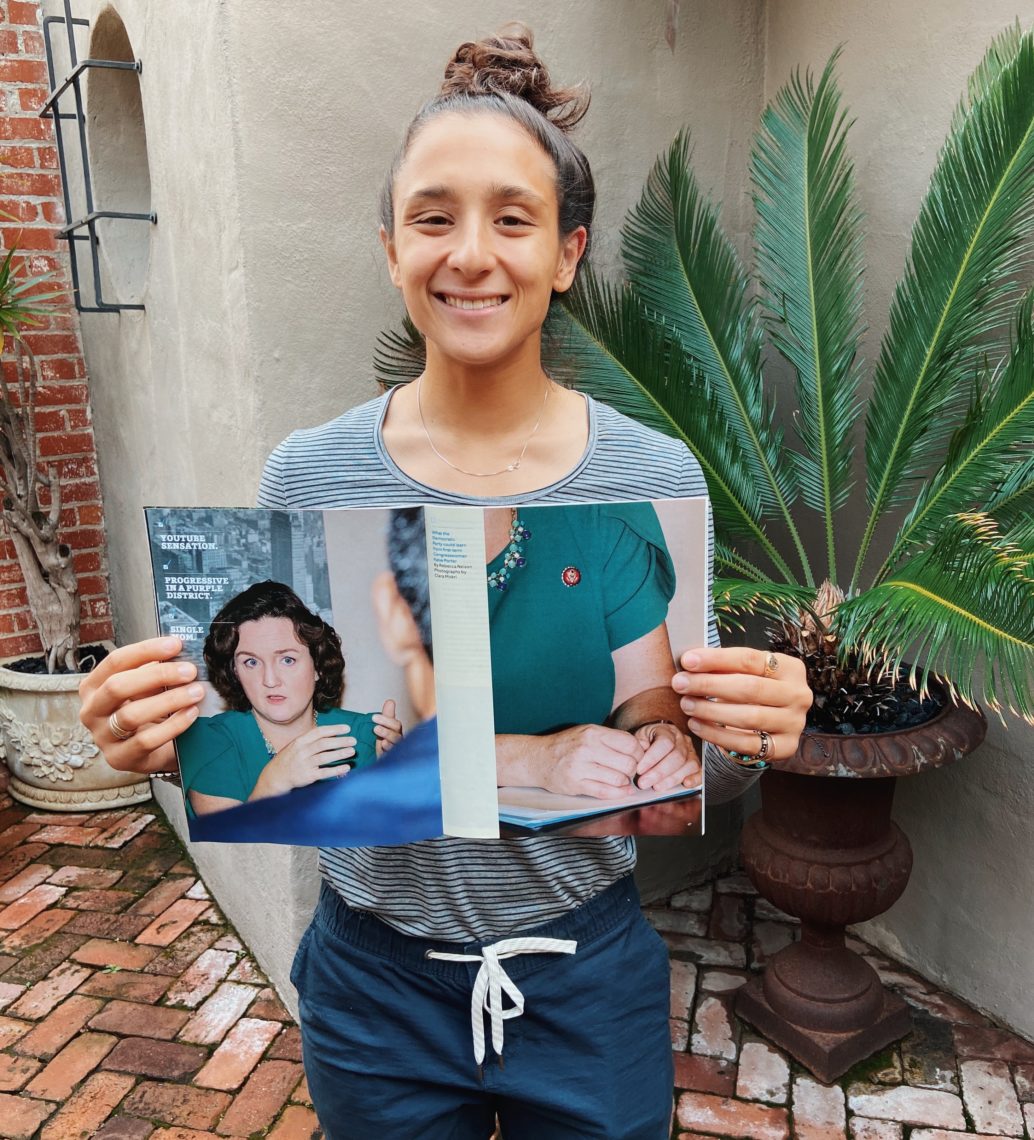
Clara Mokri (’21) with the latest issue of California Sunday magazine. Her stunning photos appear in an 8-page feature on first-term Congressional trailblazer Katie Porter: https://bit.ly/3b10e3k.
Mara Kardas-Nelson (’20) reported for The Appeal, an online publication focused on criminal justice, on COVID-19’s impact on Olympia, Wash.—emblematic of towns across Washington and the entire West Coast—where the unhoused population has increased sharply, fast outpacing services.
Goran Zaneti (’21) was creative producer on “Resistance is Life”—a documentary about an 8-year-old Kurdish girl living in a refugee camp on the Turkish-Syrian border and her hometown’s resilience against ISIS militants—now available on Amazon Prime.
Yuri Ávila (’21) was awarded Investigative Reporters & Editors’ Jennifer Leonard Scholarship— established by veteran reporter David Cay Johnston—to attend the NICAR Conference in New Orleans in March.
Tracey Quezada (’21) is editor of a documentary short, “The Pushouts”—directed and produced by UC Berkeley alum and former Investigative Reporting Program fellow Katie Galloway—that premiered in December on PBS.
Christi Warren and Tessa Paoli (’20) were accepted into UC Berkeley’s prestigious SkyDeck Hot Desk program, a six-month incubator that will afford them office space and access to mentors, investors and workshops to develop their thesis-project-turned-start-up, Route20. Route20 seeks to democratize access to campaign finance records and make the political leanings of businesses transparent to the public.
Earlier this year, our documentary students joined campus to launch an online crowdfunding campaign with a bonus: contributors received our first Berkeley Journalism-branded sweatshirts, T-shirts and Baggu bags! Help us keep up our five-year streak of Student Academy Award wins and medals: Donate here.
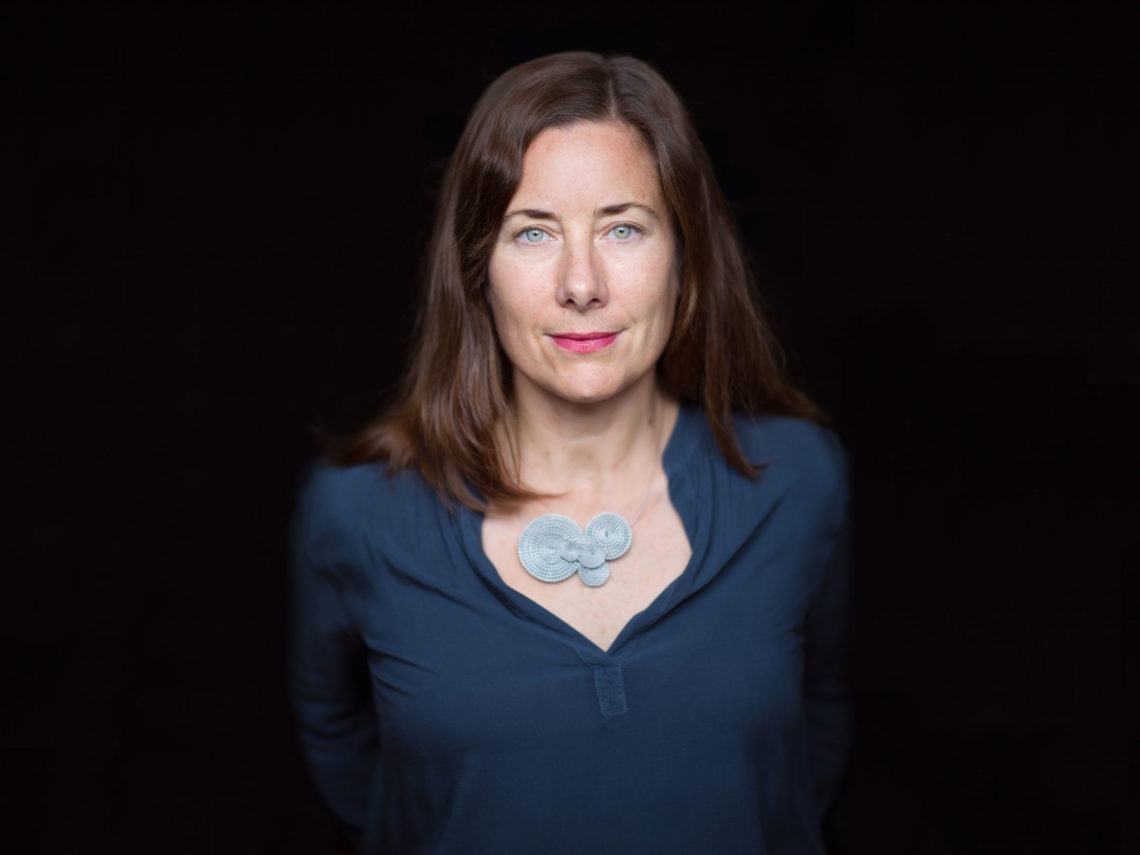
Jennifer Redfearn
In faculty news, in early April we announced the appointment of filmmaker Jennifer Redfearn as professor of documentary and director of the School’s prestigious documentary program. Redfearn, whose work has been called “engrossing,” “poignant,” “beautifully cinematic” and “intensely human”—directed and produced the 2011 Academy Award-nominated film, Sun Come Up, about an island community in the remote South Pacific that was forced to relocate by rising seas and climate change. It was also nominated for the International Documentary Association’s Pare Lorentz Award.
Redfearn has taught journalism since 2007 at Columbia, New York University, and most recently at Boston University. From 2016-2018, she taught NYU’s documentary course in Havana, where she supervised production of as many as 36 short films each year.
Lecturer Adam Hochschild wrote an article on the harsh suppression of radicals in the early 20th Century U.S. for The New Yorker, and another about lessons from the struggle to update Brussels’ Royal Museum for Central Africa in The Atlantic. Plus, the best-selling author of King Leopold’s Ghost and Spain in Our Hearts has a new book, Rebel Cinderella: From Rags to Riches to Radical, the Epic Journey of Rose Pastor Stokes. Listen to a fascinating discussion between Adam and lecturer Deirdre English here.
Make time to listen to this great interview between Prof. Michael Pollan and Terry Gross, host of Fresh Air, about his new audio book, Caffeine: How Coffee and Tea Created the Modern World, out now.
Amid the gloom, I was interviewed about how the pandemic marks the biggest opportunity since the Sept. 11 terrorist attacks “to restore to the news media this central importance to civic life that it used to have,” in USA Today. I also sent the students my recommendations for coping with the COVID pandemic that has upturned their worlds, both as journalists, and as individuals. The bottom line? Stay strong.
Lecturer/alum Marilyn Chase’s second book, Everything She Touched: The Life of Ruth Asawa, is out now. It’s about the celebrated artist who survived adolescence in Japanese-American internment camps and later developed signature hanging-wire sculptures that grace the MoMA, de Young, Getty, Whitney, and many more museums and galleries across America. Marilyn has been doing interviews with the San Francisco Chronicle, Sacramento Bee, Pacifica Radio, KQED, KALW, Architectural Digest, Artsy, and others. Meanwhile, her first book, The Barbary Plague: The Black Death in Victorian San Francisco, is finding new life amid COVID-19, due to its focus on how political denial, delay, discrimination, and scapegoating all serve to fuel raging outbreaks.
Lecturer Mark Schapiro reports in Mother Jones how “a bunch of gutsy Ukrainian journalists” helped light the fuse that led to Trump’s impeachment.
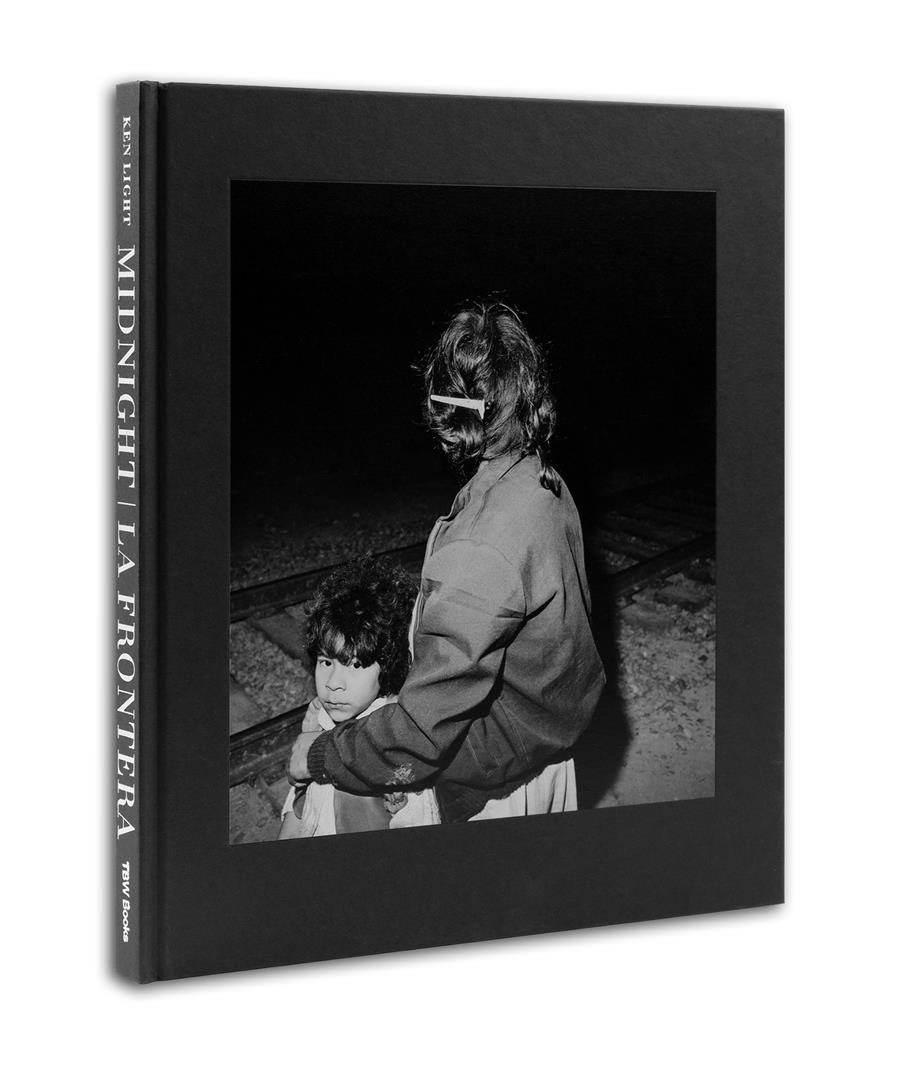
Adjunct Prof. Ken Light’s beautiful new book, Midnight La Frontera, has been published, featuring photographs and José Ángel Navejas’ first-hand, compelling memoir, presented in both English and Spanish, on harrowing night crossings between 1983 and 1987 along the California/Mexico border.
Documentary lecturer/alum Cassandra Herrman (’01) received a grant from the IDA’s Enterprise Documentary Fund to support her new film with the working title “11 Questions,” which is also getting funding from PBS Frontline.
In alumni news, literary treasure Rebecca Solnit’s (’84) latest book, Recollections of My Nonexistence, describing her formation as a writer and as a feminist in 1980s San Francisco, is available now.
Alum/New York Times reporter Mihir Zaveri (’14) is the new president of the South Asian Journalists Association (SAJA).
Brent E. Huffman (’05) was the producer on “Finding Yingying,” recently awarded the Documentary Feature Special Jury Prize for Breakthrough Voice at SXSW. The story follows a young Chinese student who goes missing on a U.S. university campus, and her family’s trip to the U.S. in the hope of unraveling the mystery of her disappearance. He is also completing Strands of Resistance, about minority groups fighting China’s economic expansion from within Pakistan, funded by the Pulitzer Center and the Buffett Institute, and Saving the Cultural Heritage of Yemen, which just received research funding.
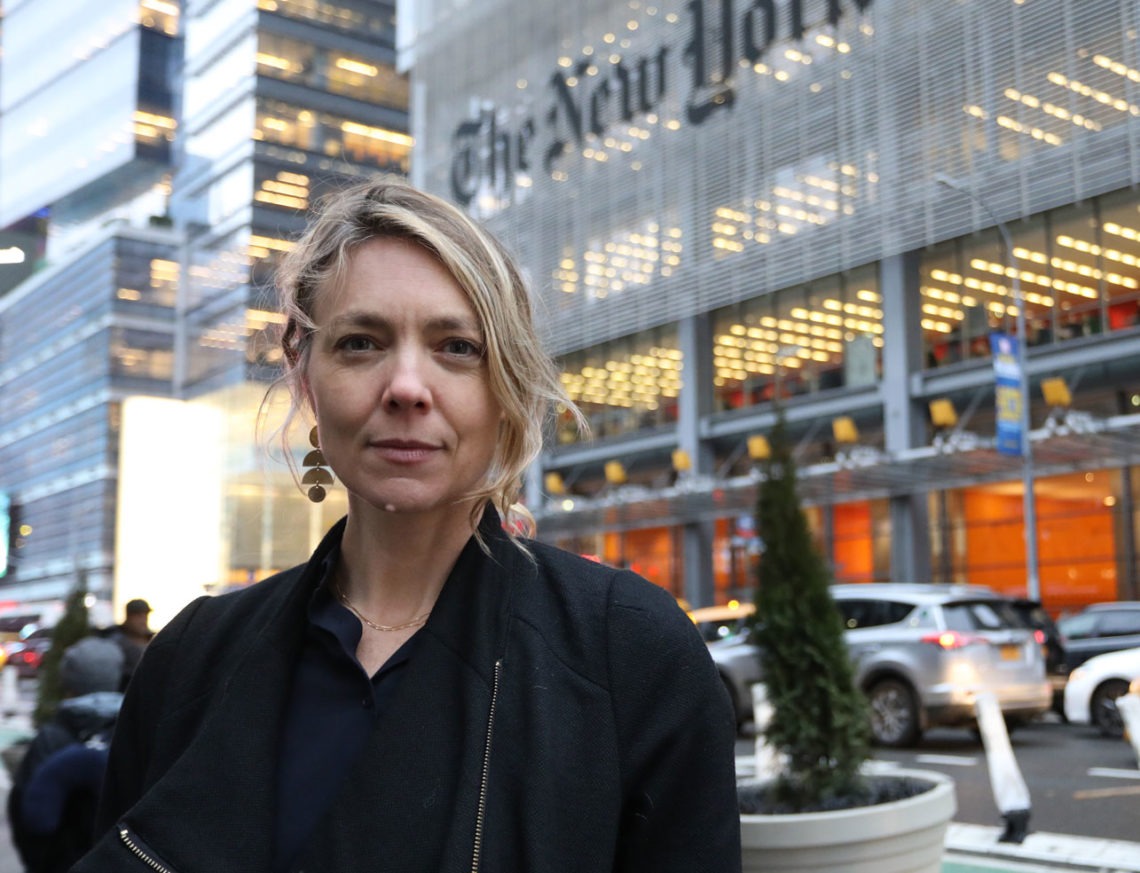
Singeli Agnew (’07) of The New York Times won the Overseas Press Club of America’s
Edward R. Murrow award for “Collision,” about a 29-year-old U.S. couple who quit their jobs to bike around the world, and were killed by ISIS in Tajikistan.
Jon Mooallem (’06) has a new book out, THIS IS CHANCE!, about the 1964 Great Alaska Earthquake, people’s capacity to come together when life falls apart, the disorienting turbulence of our world and radio reporter Genie Chance. Buy it here.
Lucas Guilkey (’19) was a finalist in the 8th annual SIMA Studios + Awards for his powerful thesis documentary, “What Happened to Dujuan Armstrong?” about a young man who mysteriously died in a Bay Area jail.
Sarah Cahlan‘s (’19) thesis film “Theirstory” is part of the line-up of the Archaeology Channel International Film Festival. Originally scheduled to screen in Oregon, the program has moved digital. From May 13-17 all selected films will be screened on one platform. You can purchase an all access ticket here.
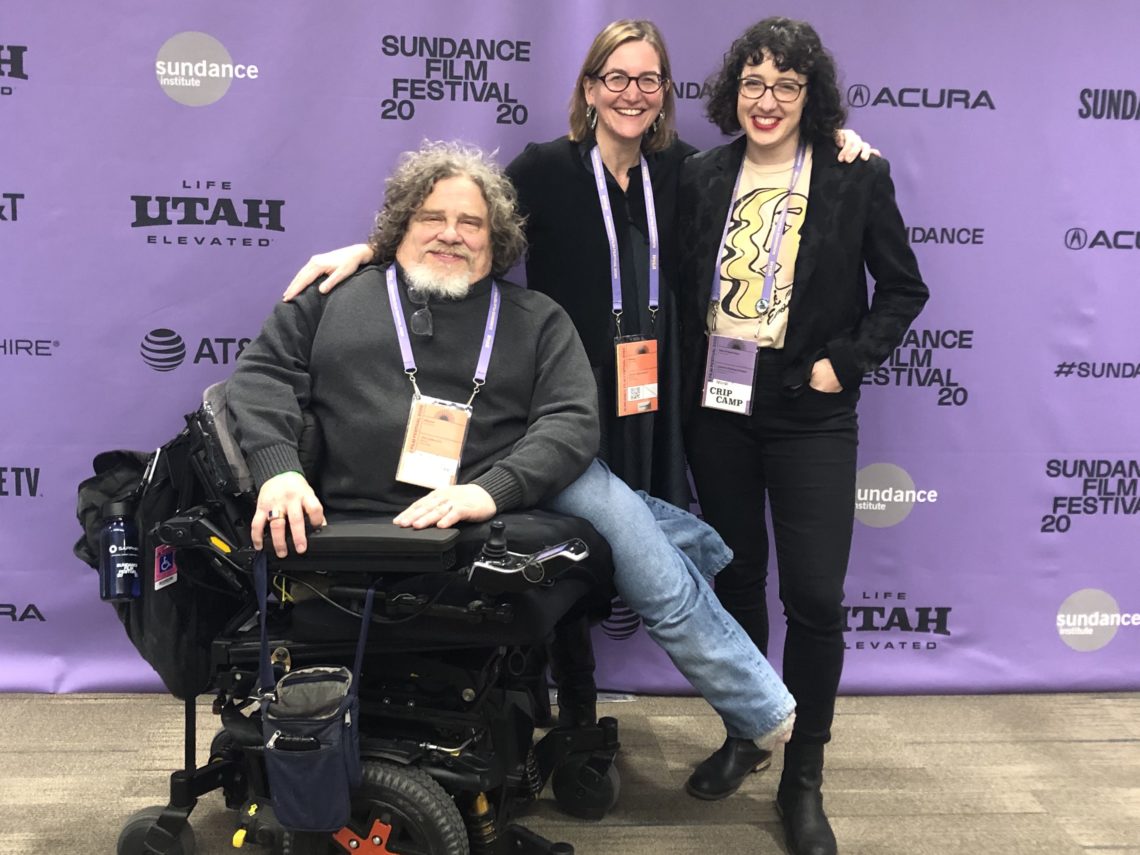
Alum Lauren Schwartzman (’18), right, at the Sundance Film Festival with the critically-acclaimed feature documentary “Crip Camp,” for which she was AP and assistant editor, along with co-directors Nicole Newnham & Jim LeBrecht. It recently launched on Netflix.
We don’t typically include career moves in this newsletter, but three recent items were too good to exclude. Greg Winter (’00) has been promoted to international managing editor at The New York Times, where he has worked for nearly 20 years. He’s only the second editor to hold that position at the paper.
And Armand Emamdjomeh (’10) has been promoted to graphics assignment editor at The Washington Post. In his new role, Armand will focus on assigning and editing graphics related to business, foreign and national security. From the announcement, “Armand has worked on some of the most ambitious projects the department has produced. In 2019, Armand was one of the graphics reporters involved with the interactive database detailing the shipment of billions of opioid pills between 2006 and 2014. He also developed a system to link large sets of original documents and stories that served as the foundation for The Afghanistan Papers.”
Last but not least, Jacob Simas (’09) has been named managing editor of Berkeleyside’s new nonprofit newsroom in Oakland. Jacob joins from Univision News and has deep roots in East Oakland and community news gathering.
Please join us in congratulating them all.
Yutao Chen and Francesca Fenzi (’19) are nominees in the 40th College Television Awards for their thesis project “Dirty Business” on the recycling of U.S. waste in Vietnam. Winners will be announced in June.
Dan Krauss (’04) directed the premiere episode of the new season of Netflix’s investigative series “Dirty Money,” focusing on the whistleblowers of the Wells Fargo scandal.
“After Parkland,” directed, written, and produced by Emily Taguchi (’06), is now available on Hulu. She’s also finishing a documentary short, titled “Asylum,” following two fathers from Honduras and their journey to seeking asylum in the U.S. Plus, Emily is working as a reporter and producer at Nightline with Marjorie McAfee (’06).
Berkeley Journalism alumni and students.
Prior to California’s shelter-in-place order, we had some amazing events and people visit the School. Waad Al-Kateab, director of the Oscar-nominated documentary “For Sama”—an intimate look at the female experience of war and a love letter from a young mother to her daughter— came to speak with our documentary students.
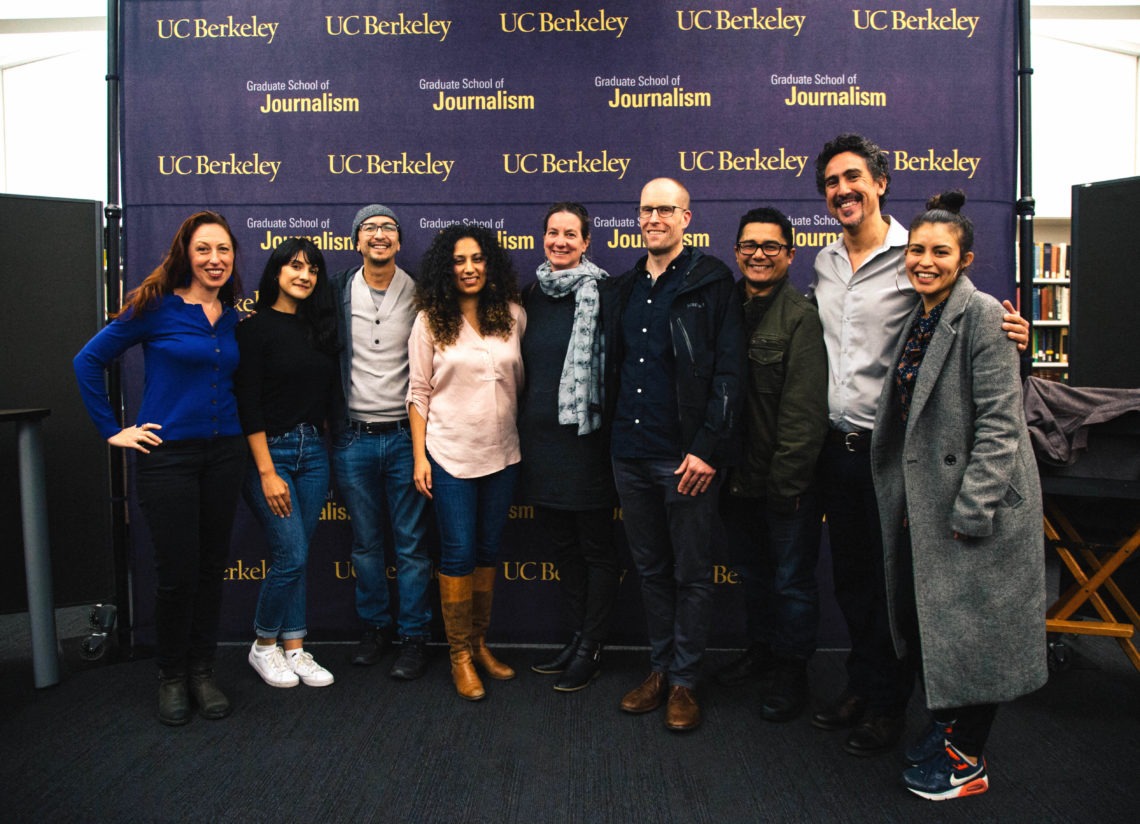
The production team of FRONTLINE | PBS / Associated Press documentary on mass confinement of migrant children at December 3rd screening (from left) Garance Burke (’04), Lulu Orozco (’20), J.P. Dobrin (’19), Daffodil Altan (’04), Martha Mendoza, John Kane, Pedro Cota (’20), Andrés Cediel (’04) and Jess Alvarenga (’20). Photo: Clara Mokri (’21)
We also hosted “Journalism & Politics in the Corn Belt: Pulitzer Prize-winning journalist Art Cullen in conversation with celebrated author and Prof. Michael Pollan” in Sibley Auditorium in January. Watch this fascinating pre-Iowa caucus conversation here.
Our 2020 Esther Wojcicki Lecturer Carole Cadwalladr—the investigative reporter who broke the Cambridge Analytica scandal that revealed the hijacking of a staggering 50 million Facebook accounts—appeared in conversation with Prof. Mark Danner in February to speak about the abuses she found and prospects for the next The Great Hack. The annual event and weeklong residency is sponsored by our friends at Taube Philanthropies. Watch the video here.
We also hosted our third annual Visual Storytelling Showcase featuring student documentaries, photography, and innovative multimedia projects in a special showcase produced and curated specifically for BAMPFA. The centerpiece of this year’s program was a screening of director/producer Eva Rendle’s 2019 Student Academy Award–winning “All That Remains”. The program was hosted by School faculty members Andrés Cediel, Cassandra Herrman and Ken Light.
In response to the pandemic, our Berkeley Advanced Media Institute is building robust online versions of its courses…the first one will be a podcasting course scheduled to launch in the spring. Learn more here.
Many of our alumni and friends have asked how to help the School through the difficult times that lie ahead. So here’s a call to action: We are asking our supporters to consider a gift by June 30 to enable us to continue to support high-impact initiatives such as the COVID-19 project. We’re offering students matchless learning opportunities that extend the reach of the teaching-hospital model that Berkeley has embraced for a decade and a half. We’d also like to offer them paid internships—at a time when major news outlets are cancelling their paid summer programs—so they can continue growing and working remotely through the summer. But all of that demands fresh resources.
Our new Assistant Dean for Advancement Jeff Rhode, himself a Cal alum, is our point person on fundraising and all things advancement. We’re excited about his plans to secure the School’s financial future, and encourage you to reach out to him with any questions, ideas and suggestions.
About this communique: News from the Desk of Edward Wasserman is a quarterly email newsletter sent to alumni, donors, students, faculty, media partners and others in Berkeley Journalism’s broad community. If you’d like to follow ongoing developments in real-time, find us on Facebook, Twitter and Instagram. Have alumni news or accomplishments to share? Please send it, along with a high-res headshot to journalism@berkeley.edu. Are you hiring? Please reach out to career.services@berkeley.edu.
